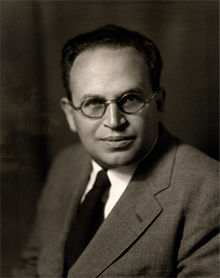Paul Lazarsfeld
Austrian-American sociologist
Paul Felix Lazarsfeld (February 13, 1901 – August 30, 1976) was an American sociologist. The founder of Columbia University's Bureau of Applied Social Research, he exerted influence over the techniques and the organization of social research.

Quotes
edit- Obviously something is wrong with the entire argument of "obviousness".
- Paul Lazarsfeld, "The American Soldier — An Expository Review", Public Opinion Quarterly, Volume 13, no. 3, (1949) pp. 377-404 at p. 380; About the interpretation of results in social science as obvious.
- In politics, familiarity doesn't breed contempt: it breeds votes.
- Paul Lazarsfeld, cited in: The English Digest; Vol. 57, 1958, p. 34
- I have always stressed that methodology is intuition reconstructed in tranquility.
- Paul Lazarsfeld (10/ 5/67), in: Ann K. Pasanella (1994), The Mind Traveller: A Guide to Paul F. Lazarsfeld's Communicating Research Papers. p. 22
- Matters often look bad, but somehow they always stop short of being disastrous. True, as in other fields, especially in social legislation, it was often an accidental event which triggered an improvement. But this would not have happened if a continuous stream of criticism had not kept us prepared to take advantage of such opportunities. It is the tragic story of the cultural crusader in a mass society that he cannot win, but we would be lost without him.
- Paul Lazarsfeld, "Introduction to the original edition," in: Norman Jacobs, Mass Media in Modern Society. (1992), p. 40
- [My goal] is to produce Paul Lazarsfelds.
- Attributed to Lazarsfeld in: Everett Rogers, (1994). A History of Communication Study: A Biological Approach. NY: The Free Press. p. 3.
Quotes about Paul Lazarsfeld
edit- It is not so much that he was an American sociologist... as it was that he determined what American sociology would be... What made Paul unique was not his involvement with ideas or his involvement with people, but his ability to stir the two together.
- James Samuel Coleman; as cited in: Wilbur Schramm, The Beginnings of Communication Study in America: A Personal Memoir 1998, p. 63